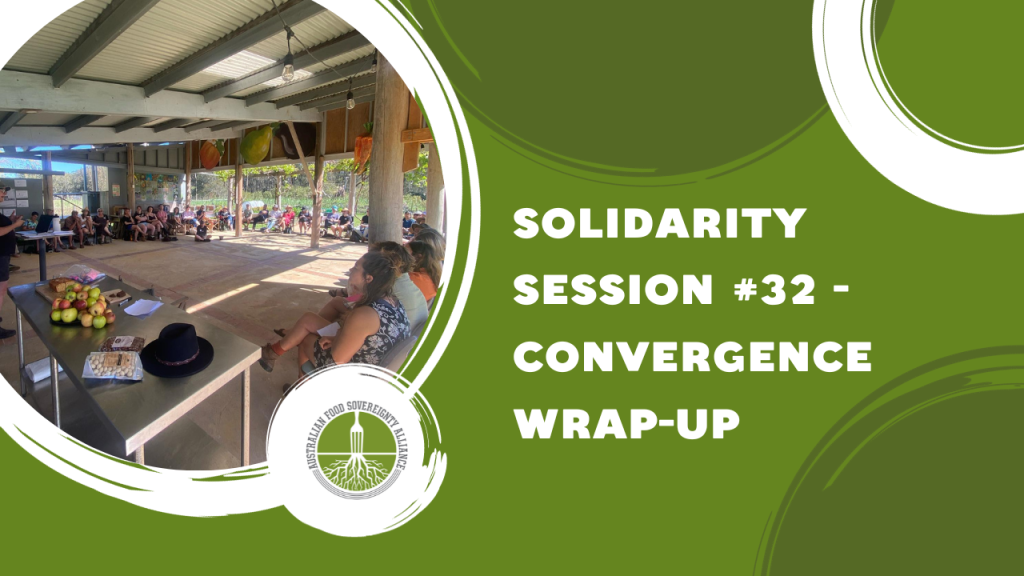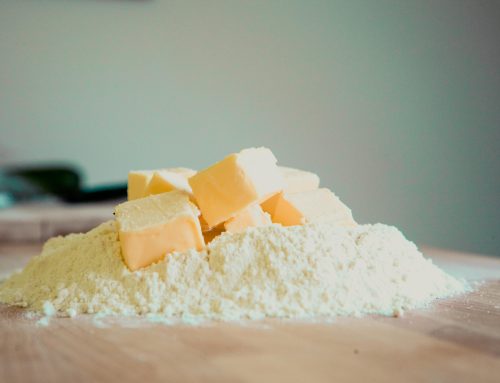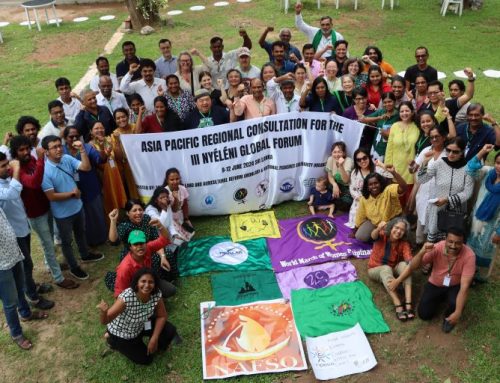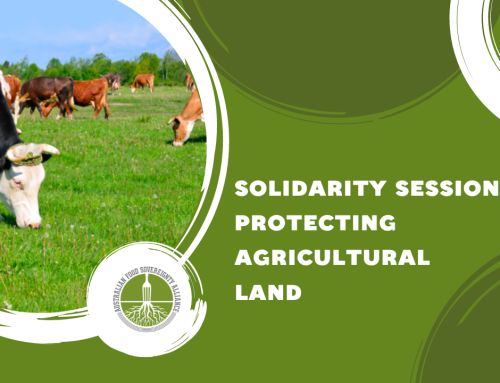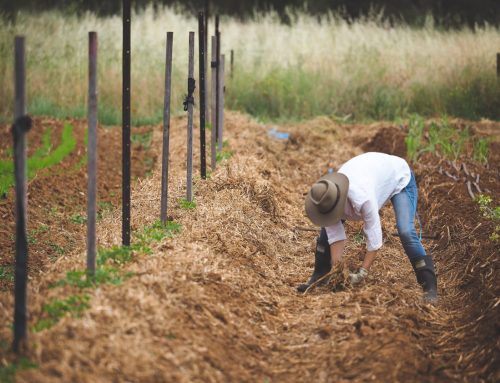AFSA 2023 National Committee Report
1) Advice/Action/Appearances 7
Farming on Other People’s Land (FOOPL) 9
AFSA in the Global Food Sovereignty Movement 10
International Planning Committee for Food Sovereignty (IPC) 10
Civil Society and Indigenous Peoples’ Mechanism (CSIPM) 10
President’s Report
2023 has been a challenging and turbulent year for many, in spite or because of coming out the other side of a global pandemic and several years of climate-induced natural disasters. Climate change, the cost of living crisis and global conflicts present multiple unfolding crises before us, which can often feel overwhelming. Yet, these crises serve to further underscore the need for food sovereignty to build resilience and nourishing connections across communities.
I write this President’s Report in the wake of the Voice to Parliament referendum result, a distressing outcome for most First Peoples, who generously offered Makarrata – the coming together after a struggle in Yolŋu language – in the hope that we might move towards truth-telling and treaty. Despite the majority vote opposed to enshrining an Indigenous Voice in the Australian constitution, and the feelings of disappointment, anger, anxiety, and sadness this evoked, we have not lost hope – because we remain active in our optimism.
We share this inspiring call to action from Gamilaraay man, AFSA member and co-recipient of the inaugural John Reid GrAiNZ Fellowship, Jacob Birch:
While some people will need to rest & reset after this, and that’s completely okay, for many of us mob we need to remain diligent and continue to do the hard work that needs to be done. For our allies, don’t let this result defeat you, let it catalyse you into action. It’s that old saying, if you want something done right, do it yourself. Look for ways to empower authentic Indigenous self-determination. Support nation building efforts. Support the grassroots mob who are doing the work on the ground. First Nations people already have a voice, and you’ve got two ears, so listen.
Looking at it glass half full, in QLD we have the lowest Yes vote per capita in Australia, only about one third of QLDers wrote Yes. But, that means one in three people want to see us succeed, which is ~1.18 million people in QLD alone. That’s a lot of momentum, and a lot of goodwill. So let’s keep moving forward. We’ve got work to do.
We stand in solidarity with all First Peoples, and will continue to listen to and work with them in our collective fight for food sovereignty and an agroecological transformation. As urged by many Indigenous and non-indigenous scholars here and in other settler colonial states, we are actively ‘pursuing a pedagogy of discomfort while accepting an ethic of incommensurability [as] a promising means of transforming relationships between indigenous and non-indigenous peoples involved in resisting the current industrial food model’ (Kepkiewicz 2015). Learning from discomfort (rather than letting it paralyse us) helps us navigate the complexities of farming and living on unceded Aboriginal lands. It enables us to promote agrarian sovereignties with full awareness of the risks of further impeding Indigenous sovereignties. This means that we accept that sometimes agrarian and Indigenous sovereignties are incommensurate, and we are working towards a world where everyone’s needs are fully met. We continue to reflect and act on discourses or actions that may appear to or actually privilege ‘settler futurity’ over First Peoples’ sovereignty. We are alert to and strongly reject any implication that non-indigenous farmers’ progress in listening to Country and becoming better custodians somehow replaces First Peoples’ ancient and ongoing custodial ethic. And while AFSA promotes various forms of landsharing and landback initiatives in addition to paying the rent (whether you own or rent within colonial systems of private property), we are always listening for more ways to promote and support First Peoples’ self-determination and sovereign right to Aboriginal lands.
The AFSA National Committee has for many years functioned informally as a research and advocacy team in a long-running participatory action research project to grow the food sovereignty movement in Australia ‘from the ground up’. We do this with a praxis and a politics embedded in a theory of change that in order to fix the crises of over- and under-consumption in undemocratic food environments, as La Via Campesina poses, we have to start by asking what is produced, who is producing it, how is it being produced and for whom. Learning by doing and also by observing, listening to, reading and actively reflecting on new methodologies, strategies and tactics from First Peoples, farmers, academic research and our allies in the global movement, AFSA has evolved into a highly productive civil society organisation working for the radical transformation of food and agriculture systems, which has strong recognition as the national body representing small-scale farmers by all levels of government, though not equally in all states, local government areas, or federal departments.
We support the development of and promote already existing emancipatory alternatives to the hegemonic structures of colonialism and neoliberal capitalism. We do this by shining a light on the diverse community economies in which our farmer and ally members operate from social and solidarity economies such as CSA to rent-free land-sharing agreements to support the next generation of agroecological farmers.
We work collectively to deal with the problem of the neoliberal state, and have developed thick legitimacy with governments and the media by making ourselves a coherent and legible constituency of small-scale farmers backed by non-producer allies. We regularly ‘surveil the state’ and report on its activities, a strategy to hold it to account to adhere to its own extant policies and regulations in service of the people, and produce evidence-based submissions to government inquiries with clear recommendations for policy reform. Where the state places barriers to agroecology and small-scale food production, we support members to navigate scale-inappropriate legislation with individual advice from the Legal Defence Fund and a forthcoming legal guide.
AFSA’s work is continually co-designed and constructed through horizontal exchanges from unconferences to agroecology dialogues and the newly updated Peoples’ Food Plan. A long-term majority women-led organisation, we take an eco-feminist approach strongly informed by First Peoples’ ways of thinking and being, valuing relationality and reciprocity with Country and community, fighting against patriarchy and colonialism that promote mastery over nature, bodies, and minds. We do not advocate gurus, ‘influencers’ or ‘thought-leaders’ to tell us how to run a revolution, instead working towards empowered solidarity by encouraging and fostering democratic participation in all aspects of the food system from production through to governance. We have operated on a strong spirit of volunteerism for over 12 years – AFSA itself is a community economy demonstrating that money is not always the best or most appropriate reward for hard work. We could not be prouder of the work produced by our many volunteers this year: from the release of AFSA’s new book Eating Democracy: The True Cost of the Food We Eat, to the updated Peoples’ Food Plan, writing this is a reminder to look back and reflect on how much we are able to achieve when fuelled by care, love, commitment, and of course, nourishing and delicious food.
We have work to do to make visible our efforts towards food justice – both policy reform and systemic transformation, in particular to our non-producing allies, to demonstrate the many ways food sovereignty is not ‘merely agrarian’. Building on our belief that the movement will grow best relationally, we must equip farmers and other food system actors at the local level to bring more people into the food sovereignty movement, through grassroots democratic associations, events, mutual aid, and horizontal knowledge sharing that will deepen empathy and pave paths for empowered solidarity. To that end, we anticipate a flourishing of Meat Collectives across Australia as small-scale livestock farmers everywhere come together to solve the critical loss of access to the infrastructure they need – abattoirs, boning rooms, and refrigerated transport. The national committee will propose a 2024 campaign for a Universal Basic Income (UBI), hopefully in partnership with other organisations such as the Right to Food Coalition, the Australia Institute, and other aligned groups.
At this year’s Food Sovereignty Convergence we will gather and be welcomed to Brinja-Yuin Country by Traditional Custodians. Our very ways of doing – our ethics of practice – help alienate us from the ways of thinking and the structures of colonial capitalism, and so we ask permission to gather on Brinja-Yuin Country and make exchanges of knowledge, food and shelter in (mostly) non-capitalist relational ways, through barter, potluck, and gift economies. As always, learning will be horizontal, dialogic and democratically organised, as we open the space for sharing what we have achieved and what we want to achieve in the coming year.
In terms of organising, the National Committee will propose the development of guides and templates for the formation of local democratic associations to interface with local and state governments, and to build cooperative infrastructure for agroecology and food sovereignty. We will debate ways forward for decolonial land redistribution and the development of an Agrarian Trust. Identifying the existing communities of practice in our membership (such as the GrAiNZ community, who are working to re-localise grain economies, or the academics in the Agroecology Action Research Network), we will discuss others we can help to collectivise with national support to help more people see themselves in our movement (e.g. market gardeners and students).
Politically, we have called for nominations for state liaisons, which could be individuals or small groups of people to be the focal point for farmers, First Peoples, and government in each state and territory to help navigate the complexities of context-dependent relations and legislation. We plan to offer regular solidarity sessions on political formation, which will include aspects of civic participation in policy reform, holding governments to account under existing policy frameworks, and using the Fourth and Fifth Estates.
Adopting food sovereignty as an ethics and practice means that we do not face the myriad crises in front of us with apathy or despair, but instead with active optimism that the case for transforming our food system has never been stronger.
On behalf of the National Committee, I’d like to thank everyone who has been involved in AFSA’s work this year, in particular the dozens of volunteers who brought together the updated Peoples’ Food Plan and Eating Democracy. AFSA is its members – we could not have grown our movement without you, and we encourage everyone to continue to take forward the language and practices of food sovereignty in your local communities, rural and urban alike.
This year we farewell Secretary La Vergne Lehmann, Vice-President Randal Breen, and general committee members Dan Cordner and Amy Pagett. Thank you all for your enthusiasm, commitment and intelligent contributions to a diverse workload from communications, campaigning, furthering the agroecological transformation, and government submissions! We look forward to continuing to work with you in local capacities. <3 To the rest of the Committee, thank you for your many efforts from the local and national to the international, and for your solidarity and strength in increasingly challenging global and local circumstances.
It feels incorrect to observe that the year is winding down, as many of us prepare for bushfire season, keeping up with spring growth, and preparing for Christmas deliveries, all signs that we should put more stock in the seasons than a northern-born calendar. We do hope that amongst the busy-ness you find time to rest and reflect on a job well done and a future worth fighting for. We hope all our members are able to remain active in your optimism, actively working for the changes the world so desperately needs so that everyone has equal access to nutritious and culturally-appropriate food grown and distributed in ethical and ecologically-sound ways, and is able to exercise their rights to democratically participate in our food and agriculture systems.
We are collectivised, we are organised, and we are actively optimistic.
Viva la revolución!
Tammi Jonas, President
Financial Report
AFSA finishes this year in a strong financial position with just over $40,000 in the bank. We returned a small loss of $1,500 while accounting for all costs associated with publishing of Eating Democracy and are in the final stages of working on the Peoples’ Food Plan and Legal Guide plus rollover expenses from last year’s Convergence. All association registrations are now filed and up to date after a three year backlog.
We successfully auspiced the GrAiNZ gathering and Deep Winter Agrarians and are currently holding $7800 on our balance sheet for future events.
The Membership issues of the previous few years are primarily ironed out, with improved membership revenue of over $20,000. With the finalisation of the Legal Guide, PFP and Eating Democracy we envisage membership to continue to grow. With tight financials for the 2023 year we did not convene a mid-year National Committee Retreat and were thankful to receive a $15,000 grant from Sustainable Table for the coordination of the Legal Guide which continues into 2023-2024 financial year.
We also received a donation of $7000 from Ipswich Food Collective, which has sadly wound up its wonderful work in southern Queensland, and will discuss options for how best to use these funds at this year’s Convergence, such as seed funding for small scale food initiatives in similar spaces or towards the FOOPL and/or First Peoples’ Funds.
Just over $30,000 was raised for the production of Eating Democracy, all costs which have now been fully paid out and we are holding a stock of 1650 books valued at $35 per book.
Our budget forecast for 2024 will return us to surplus and attempt to offset the previous year’s losses ensuring a continued healthy bank balance. There are forecast projects such as the Agrarian Trust that we hope to raise funds for before committing to these in a financial capacity.
We look forward to providing even more membership benefits in 2024 including a revised Peoples’ Food Plan and Legal Guide which, along with sales of Eating Democracy, should hold us in good financial stead.
Membership Report
AFSA’s membership enjoys a slow but steady increase from last AGM from 246 to 275 members. As reported at the end of last financial year, AFSA updated its membership system to iron out issues with the previous system. As such, this year has been a process of encouraging members to update their details to ensure they remain on board with AFSA. If you haven’t already, please log on to the AFSA membership portal to update your details!
As well as adjusting to a new membership system, we’ve received emails from members who have regrettably had to cancel their membership due to the rising cost of living. Internal discussions have led the AFSA National Committee to consider how we can add value to membership for farmers, farmer allies and First Peoples, and are looking at rolling out a survey and phone calls to AFSA members to gauge this.
In terms of membership benefits, AFSA has been working on some exciting projects to support members, which will be available on the AFSA website over the next 12 months. This includes the AFSA Legal Guide, a living resource to help farmer members navigate common challenges under legislation, planning provisions and regulation across all states and territories; additional support through the Legal Defence Fund; the updated Peoples’ Food Plan as a living document to be used as a resource for members to compile policy submissions to government across all levels; and an expansion of example agreements for Farming on Other People’s Land (FOOPL). AFSA notes that the ongoing pandemic, climate change contributing to recent floods, and economic crises has negatively impacted many farmers across the country, leading to cancelled memberships where needed. We hope that continuing our focus on providing resources and support to farmers and allies over the next 12 months will position former members to renew and take full advantage of these offerings.
As many of these recent challenges are ongoing, we look forward to building solidarity and support with new and existing AFSA members in 2024.
Legal Defence Fund
-
Advice/Action/Appearances
NB: Farms have been de-identified for privacy.
| Date | Client | Advice/Action |
| Oct 2022 | Anonymous (NSW) | Re: Legalities of small-scale on-site slaughter in NSW. |
| Feb 2023 | Anonymous (NSW) | Re: Workplace policies and procedures including templates for volunteers/interns. |
| Feb 2023 | Agriculture Victoria | Re: Packaged meat guidance – draft for final comment. |
| Mar 2023 | Anonymous (VIC) | Re: Help applying for planning permits for a small-scale pig farm. |
| Aug 2023 | House of Representatives Standing Committee on Agriculture | Re: Evidence to support our submission to Federal Government on the Food Security Inquiry. |
2) Submissions
| Date | Regulator | Submission Title and Summary |
| 9 January 2023 | House of Representatives Standing Committee on Agriculture | Parliamentary Inquiry into Food Security |
| 7 February 2023 | CSIRO | CSIRO Transforming Australian Food Systems discussion paper |
| 15 June 2023 | Senate Standing Committees on Environment and Communications | Submission on the Nature Repair Market Bill 2023 and Nature Repair Market (Consequential Amendments) Bill 2023 [Provisions] |
| 11 June 2023 | Queensland Health | Review of the Food Act 2006 (QLD) |
| 5 August 2023 | Agriculture Victoria | Submission to the Victorian Biosecurity Strategy
(VIC) |
Farming on Other People’s Land (FOOPL)
Farming on Other People’s Land (FOOPL) has been a lively area of work this year, largely thanks to AFSA National Committee member, Eliza Cannon who has taken over as Chair of the FOOPL Working Group.
At last year’s AGM, we announced the rollout of a FOOPL fund for aspiring growers to access critical financial support to establish their own enterprise, from purchasing equipment to obtaining licences. While we have not received applications for funding this year, we endeavour to publish a form on the AFSA website that will signpost this opportunity to members across the country.
We have also established a FOOPL Facebook Group, which has racked up 400 members as a matchmaking platform for aspiring growers and landowners.
Perhaps the most exciting development for FOOPL this year has been in starting discussions about the establishment of an agrarian trust in Australia. We’ve established an Agrarian Trust Working Group under FOOPL, led by AFSA member and lawyer Michele Sabto, to finesse the scope of what an agrarian trust can and should look like in an Australian context.
AFSA in the Global Food Sovereignty Movement
In addition to AFSA expanding its projects at home, our solidarity with the international food movement has shown no signs of slowing down over the past year. We would like to extend our gratitude to AFSA’s comrades across the globe, for their continued solidarity as we work together to overhaul the injustices of colonial capitalism, free-trade and global food systems. Below are the highlights of international meetings over the past year.
International Planning Committee for Food Sovereignty (IPC)
We continue to work closely within the structures of the IPC as a platform for the diverse organisations that constitute the global food sovereignty movement. In December 2022, AFSA participated in COP15 of the Convention on Biological Diversity (CBD) – aka the Biodiversity COP – where alongside many comrades, we achieved recognition of the role of agroecology in sustainable food production in Target 10, as well as targets to reduce the use and impacts of agri-chemicals. It was our first COP, and while gruelling and often dispiriting, we remain committed to participating in these multilateral processes just as we remain committed to policy reform here in Australia. You can read our updates from the Montreal venue here.
In July 2023, we attended follow up meetings with our biodiversity, environmental, and climate activist comrade organisations in Kuala Lumpur, hosted by the Third World Network, to plan ongoing actions to ensure the Kunming-Montreal Global Biodiversity Framework is implemented at global, regional and national levels. This work is one critical element of the broader agenda of the ongoing Nyéléni process, which will culminate with a gathering in India in 2025 of an incredible diversity of the world’s social movements. In June, the IPC convened the inaugural steering committee meeting for the Nyéléni process, bringing together international social movements beyond food sovereignty, inclusive of trade unions, feminists, blak activists, farm workers, climate and biodiversity activists, amongst others. And this week, we collectively mobilised against the corporate takeover of global governance, boycotting and denouncing the illegitimate World Food Forum that seeks to erase the multilateral spaces such as the FAO and CSIPM.
Civil Society and Indigenous Peoples’ Mechanism (CSIPM)
Our work within the CSIPM this year has centred around network building for our sub region. Sari, our Coordination Committee member, has been identifying relevant local organisations and inviting them to participate in CSIPM and CFS processes, alongside information sharing.
This year, the CSIPM was faced with multiple financial crises, a sudden change of Coordinator in June, and attempts to undermine the CFS from a wider movement within the FAO, via the illegitimate World Food Forum.
Hence, a core dimension of the work this year has also been participating in a collective and grassroots push back against the corporate capture of the FAO, as various actors and groups within the CSIPM initiated the Autonomous People’s Response.
Regardless of the financial and institutional barriers, the Secretariat and Coordination Committee of the CSIPM have managed to maintain and organise multiple Working Groups including Women and Gender Diversities, Data and Inequalities WG, as organising spaces for those most affected and impacted on the ground to have their say in CFS processes and policy frameworks. The CSIPM also successfully supported participation in Rome events, and are co-organising three side events this month during the CFS 51 Plenary.
La Via Campesina
This year most of our farmer members of the National Committee struggled to find the time to participate in La Via Campesina’s annual regional conference, as well as its youth and women’s articulations, but in the true spirit of growing the revolution, AFSA president Tammi Jonas’s youngest progeny Atticus (19 years old) was able to attend the youth articulation in southern Thailand and the regional conference in Phnom Penh, Cambodia. You can read Atticus’ report from the youth articulation here. Happily, another AFSA NC member, anthropologist Mirella Gavidia, was able to attend the women’s articulation in Manila, Philippines, forming friendship and solidarity.
We will finish the year at the La Via Campesina International Conference – slated for every four years but delayed by COVID by two years – taking place in Bógota, Colombia in the first week of December, where we will strategise once again as a global collective about how to defeat the multinationals and ultra-rich elites who seek to erase the peasants and Indigenous Peoples of the world.
Viva!
With solidarity,
The 2022-23 AFSA National Committee:
- Tammi Jonas, President
- Randal Breen, Vice-president
- Penny Kothe, Treasurer
- La Vergne Lehmann, Secretary
- Dan Cordner
- Amy Pagett
- Eliza Cannon
- Mirella Gavidia
- Adele Wessell
- Ruth Gaha-Morris
